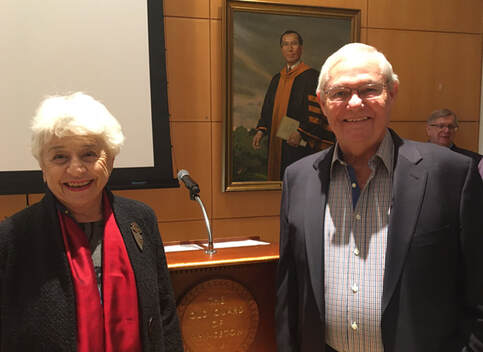October 23, 2019
Truth to Power: A History of the National Intelligence Council
Robert Hutchings
Professor of Public Affairs, University of Texas at Austin
Minutes of the Seventh Meeting of the 78th Year
On October 23, 2019, Julia Coale presided over the seventh meeting of the 78th year. Shirley Satterfield led the invocation. Bernie Miller read the minutes of the preceding meeting. There were 141 people present: The following guests were introduced:
Sandy Hyatt introduced by Bob Varrin
Frank Pizzi introduced by Ugi Horowitz
Jill Burchfield introduced by Frank McDougald
Kim Hutchings introduced by Ruth Miller
J Morgan introduced by Lincoln Hollister
Robert Hutchings gave a talk titled "Truth to Power: A History of the U.S. Intelligence Council." I am going to start with some of Dr. Hutching’s many credentials because they are essential to understanding the importance of his talk and his connection to Princeton.
Robert Hutchings has been the Professor of Public Affairs and Dean at the Lyndon B. Johnson School at the University of Texas. Before U.T., he was Diplomat in Residence at Princeton University and Assistant Dean of the Woodrow Wilson School. Most important for the purposes of his Old Guard talk, from 2003-05, he was Chairman of the National Intelligence Council (NIC) in Washington, D.C. During his combined academic and diplomatic career he has served as Director for European Affairs with the National Security Council and Special Adviser to the Secretary of State, with the rank of ambassador. He is the author or editor of many books, including American Diplomacy and the End of the Cold War and, most recently, Truth to Power, which was on sale at the Old Guard meeting.
Dr. Hutchings started his talk with an introduction to his latest book, Truth to Power, which analyzes the key decisions and personal reflections of the eight chairs of the NIC, spanning a quarter century since the end of the Cold War.
The most important conclusion that framed his talk is this conundrum: The need for strategic analysis has never been greater, but the distain for analysis of any kind has also never been greater.
To explain this puzzle Dr. Hutchings focused on the three important leitmotifs that were common to the tenures of all eight chairs of the NIC.
Respectfully submitted,
Anne Seltzer
Sandy Hyatt introduced by Bob Varrin
Frank Pizzi introduced by Ugi Horowitz
Jill Burchfield introduced by Frank McDougald
Kim Hutchings introduced by Ruth Miller
J Morgan introduced by Lincoln Hollister
Robert Hutchings gave a talk titled "Truth to Power: A History of the U.S. Intelligence Council." I am going to start with some of Dr. Hutching’s many credentials because they are essential to understanding the importance of his talk and his connection to Princeton.
Robert Hutchings has been the Professor of Public Affairs and Dean at the Lyndon B. Johnson School at the University of Texas. Before U.T., he was Diplomat in Residence at Princeton University and Assistant Dean of the Woodrow Wilson School. Most important for the purposes of his Old Guard talk, from 2003-05, he was Chairman of the National Intelligence Council (NIC) in Washington, D.C. During his combined academic and diplomatic career he has served as Director for European Affairs with the National Security Council and Special Adviser to the Secretary of State, with the rank of ambassador. He is the author or editor of many books, including American Diplomacy and the End of the Cold War and, most recently, Truth to Power, which was on sale at the Old Guard meeting.
Dr. Hutchings started his talk with an introduction to his latest book, Truth to Power, which analyzes the key decisions and personal reflections of the eight chairs of the NIC, spanning a quarter century since the end of the Cold War.
The most important conclusion that framed his talk is this conundrum: The need for strategic analysis has never been greater, but the distain for analysis of any kind has also never been greater.
To explain this puzzle Dr. Hutchings focused on the three important leitmotifs that were common to the tenures of all eight chairs of the NIC.
- Truth to power, which started with a built-in tension between policy and intelligence in the Truman years, when Truman sent a directive to the Director of Central Intelligence (DCI) to “accomplish the evaluation and dissemination of strategic intelligence.” This directive was sent neither to the Secretary of State nor to the Pentagon, thus beginning the tension between policy and intelligence.
- The ever-present specter of intelligence failure starting with Pearl Harbor in 1941 and continuing through the 9/11 intelligence failure and the weapons of mass destruction (WMD) intelligence failure in Iraq.
- The ambivalent commitment of senior leaders to strategic intel starting with Franklin Delano Roosevelt (FDR) and continuing through the present administration.
- Rethinking the war on terror---including leaderless jihad, the logic of terrorism, ziggurat of zealotry (my favorite term!) and a history of how previous wars on terrorism were won.
- A study on Global Trends 2020 written in 2004 to anticipate the world of 2020. This study focused on a) the dark side of globalization, b) the rise of China and India, c) the rise of a new caliphate, and d) (very interesting considering this was written in 2004) the fracturing of the European Union (EU)!
Respectfully submitted,
Anne Seltzer

